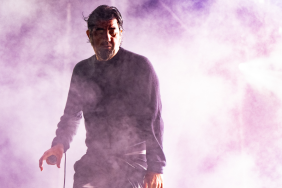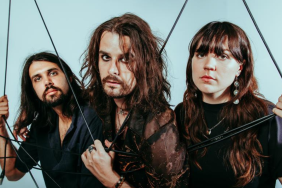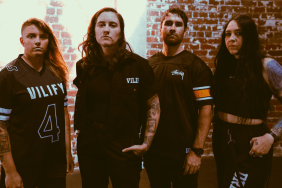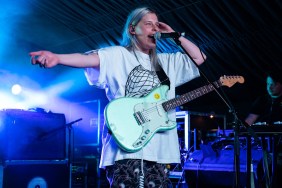Pendulum have taken the world by storm, which is amazing given the band hails from humble Perth. However, their unique mix of dance and rock has piqued the ears of music fans, and their new album Immersion is set to cement their status as drum ‘n’ bass kings. Music Feeds caught up with Gareth before their Sydney show next Friday to talk about kicking it with Tiesto, the false Prodigy bust up, and of course that ABC Remix.
Music Feeds – Pendulum
MF: You guys are in the middle of a tour?
G: Yeah, it’s a festival run at the moment, then we hit Australia, then come back and do the UK again. We just got back from Japan, did a couple of festivals there; it covers two cities – Summer Sonic it’s called.
MF: What’d you think of Japan, because I went there during Christmas – went to a couple of gigs; they’re strange music fans.
G: Yeah it’s weird, we had a festival in front of thousands of people; they’re so respectful and quiet in between songs, then the song starts and they go mental, heinous circle pits.
MF: Has it been difficult to transfer Immersion to the live stage; it’s a big sounding album?
G: No, the difficulty was during the last album when we were developing the live show. Now we’ve got it down, it’s a little bit time consuming, but it’s straight forward because we know what we need to do to get them in their live format. But we’re also now slightly conscious of what songs were going to end up being the live songs, when we wrote Immersion. Songs like Vulture and Crush, were always going to be in the live show, whereas Coder is strictly an album tune.
MF: Did it take a while to refine the live act originally?
G: It took a year of just developing the technology to transfer what we do in the studio to a real-time playing environment; a lot of tech, computers, and cracking open Linux boxes.
MF: You were saying that you were consciously writing live tracks; were you also consciously trying to sound different to Insilco, take a next step, or it’s natural?
G: I think the main idea behind Immersion was getting the favourite parts of our last albums and taking another step. We really wanted to make a conscious effort of developing and revisiting the dance music side of ourselves, but at the same time the core of it was electronic; we tried to make it as rocky as possible.
Taking direct influence from Led Zeppelin and Queens of the Stone Age, so Immersion was consciously us sticking to our dance roots, but there are moments of rock echoes.
MF: There is a lot of talk about you guys bridging the gap between rock and dance, Prodigy too – the gulf between those genres; does that ever come into the psyche when creating an album or you don’t think about it, as a band?
G: I think now we think about it because it’s constantly pointed out to us, because we are that and that’s what we’re doing, but it’s not what we intended to do. Rob and I grew up in Perth, hiding the fact we were into dance music. When we were young, you were either into Metallica or Nirvana, surfed or skated. It was uncool to be a tech nerd, and we were privately into that, but I did love ACDC and Metallica, I surfed a lot, but I also really loved electronic music.
In Australia it was in it’s infancy, but in Europe and the UK it was massive then, the rave culture, drug culture, but here it was about grunge and metal, so we grew up hiding it, embracing rock, grunge, punk, then later on we got into metal, formed a band in high school, but dance music was always an underlying theme. Then drum and bass came along, and that was so dark and twisted, it had the same kind of energy that rock metal and punk did, we got really into it, embraced it, and before long the influences that we’d grown up with from rock and metal, crept their way in there, rock and metal were always there, and once we started making dance music it was only a matter of time before guitars found their way in there.
MF: The context of where you grew up, and then what you secretly liked, eventually coming together.
G: Definitely, I think that’s somewhat responsible for our success, because we didn’t grow up in dub play culture, we weren’t rudeboy British turntablists. We surfed, skated, and played guitars, so coming from Perth, it helped us to stand apart, not get to drawn into that scene.
MF: You’ve been successful over there; do you still keep an eye on what’s going on, keep your finger on the pulse?
G: Yeah, both the UK and Australia; dance music is still our main focus. When we DJ, our peers are deadmau5, Calvin Harris, dub step guys like Kasper, and Joker. But when it comes to doing gigs our peers are the big rock bands. Last weekend we supported Iron Maiden, Alice in Chains and Slayer, and then two days before we supported Tiesto.
MF: That pretty much sums it up.
G: Exactly, that weekend we were saying that, ‘this whole weekend sums up how twisted everything is, from Tiesto to Iron Maiden’.
M: You’ve been in the UK for some time, done well, toured Europe a lot, but how has the response been in the US? I know it’s not been as successful, any reason why?
G: The States is just a hard market to crack, it’s so big, America is really into commercial music, commercial radio stations have a lockdown, force feed the music, and they buy it accordingly. So radio is hard. Then all you can do is tour, and touring constantly kills the band, all you can really do in America is hope for a lucky strike. We would never tour until we hated each other.
MF: Have you toured in America?
G: Yeah, we’ve done quite well for how little attention we’ve given it. Got airplay on some of the major radio stations in New York and Chicago, but we’re not going to destroy ourselves trying to crack the USA.
MF: Just speaking of radio, did you get airplay on jjj?
G: Yeah, not as quickly as we would’ve hoped, to be honest, but we moved to the UK promptly. Our first track was the one that blew up, so we jumped countries quickly, but that was about momentum. Back home, it took Australia a bit of time to catch on, but once it did they’ve supported us ever since.
MF: Just because there’s a big argument going on about digital radio in Australia, and they’re changing the laws so you don’t have to have 25 percent of Australian content on digital radio. Commercial radio stations are buying slots on air and setting up specialist shows like Radio Gaga, solely lady gaga music. Just wanted to see what you thought, being a successful Australian band?
G: It’s good because it’s allowing the freedom of broadcast, I guess. Maybe there are bad points to it, but I’d probably need to know more. The thing that springs to mind is the saturation effect, too many channels, that’s the spice of life though, variety. Maybe it’d be good for up-and-coming-artists though, because you could have stations or shows featuring just what’s coming up in the underground.
MF: Liam Howlett is on Immunise; how was it to work with him?
G: Yeah cool, he’s a relationship that we forged on the BDO in 08/09, we’d been on the bill with them before, seen them around, but we didn’t really know them. Then at BDO that year, it’s a one-month party so we got to know them. We discussed this whole kind of pretend hatred between our bands, this alleged beef, it didn’t exist, it was a beat up. So we got together and thought ‘why don’t we do a tune, bury the hatchet’, and Liam was up for it.
M: You’re coming out here soon; do you find different crowds have a different reaction?
G: Not really, I mean even the Japanese end up in bloody circle pits. I think there is something about the music when it’s coming out of the speakers that makes people want to destroy themselves, and that’s worldwide, it’s quite a global thing.
MF: Finally the ABC remix. When it came out over here, never heard so many people just frothing on one tune, I think it was because we all grew up with that sound, that the idea?
G: Exactly, that’s exactly why we did it. When I heard it, I went searching for it and when I finally found it, it brought back so many memories of… like dinner time or whatever, doing homework, as I was growing up.
I said we got to remix this; it sounds like a super hero theme, with major chords, it’s supposed to be uplifting, I think news shows do that to make it authoritative. You look at all of them, BBC, America; they’re all kind of in the same key. But the Aussie one was a winner, so we had to remix it.












